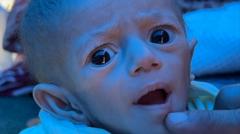
Siwar's Story: A Glimpse into the Ongoing Struggle for Families in Gaza
Five-month-old Siwar, recently discharged from hospital in Gaza, represents a stark reminder of the challenges facing families in the region. While her release signifies a positive step, the journey ahead for Siwar and her loved ones is fraught with difficulties, highlighting the critical need for continued support and intervention.
Siwar's Battle with Malnutrition
Siwar's case brought to light the alarming rates of malnutrition impacting infants and young children in Gaza. Her admission to hospital was prompted by severe malnourishment, a condition exacerbated by limited access to nutritious food and essential healthcare services. Medical professionals worked tirelessly to stabilize her condition, providing the necessary treatment and nutritional support to initiate her recovery.
The Challenges of Post-Hospital Care
Despite her discharge, Siwar's ongoing well-being remains a significant concern. Her family faces numerous hurdles in ensuring she receives the sustained care and nourishment she requires. These challenges include:
- Limited Access to Food: The availability of nutritious food remains scarce and expensive, making it difficult for families to provide adequate meals for their children.
- Economic Hardship: Widespread unemployment and poverty further strain household resources, limiting the ability to purchase essential items, including baby formula and nutritious foods.
- Overburdened Healthcare System: The healthcare system in Gaza is under immense pressure, with limited resources and staff to provide comprehensive follow-up care for discharged patients like Siwar.
- Sanitation and Hygiene Concerns: Poor sanitation and limited access to clean water contribute to the risk of infections and diseases, further impacting children's health and nutritional status.
A Family's Perspective
Siwar's family is deeply committed to her well-being, but they are struggling to cope with the overwhelming circumstances. Securing enough food for each day is a constant struggle, and the emotional toll of witnessing their child's suffering is immense. They expressed their gratitude for the medical care Siwar received but voiced their concerns about the long-term challenges they face.
The Wider Context: Malnutrition in Gaza
Siwar's story is not an isolated incident. Malnutrition rates among children in Gaza have been steadily rising, fueled by a complex interplay of factors, including:
- Protracted Conflict: Years of conflict have disrupted food production, supply chains, and access to essential services.
- Economic Blockade: The ongoing blockade has severely restricted the movement of goods and people, exacerbating economic hardship and limiting access to essential supplies.
- Infrastructure Damage: Repeated conflicts have damaged critical infrastructure, including water and sanitation systems, further impacting public health.
- Limited Humanitarian Access: Restrictions on humanitarian access hinder the delivery of aid and assistance to those in need.
The Need for Sustainable Solutions
Addressing the root causes of malnutrition in Gaza requires a comprehensive and sustainable approach. This includes:
- Easing Restrictions: Lifting restrictions on the movement of goods and people to allow for economic recovery and improved access to essential supplies.
- Investing in Infrastructure: Rebuilding and strengthening critical infrastructure, including water and sanitation systems, to improve public health.
- Supporting Local Food Production: Investing in local agriculture and food production to enhance food security and reduce dependence on external aid.
- Strengthening Healthcare Systems: Providing adequate resources and training to healthcare professionals to ensure they can provide quality care to children and families.
- Increased Humanitarian Aid: Scaling up humanitarian assistance to meet the immediate needs of vulnerable populations, including children and pregnant women.
Looking Ahead
Siwar's story serves as a powerful reminder of the urgent need to address the humanitarian crisis in Gaza. While her release from hospital is a positive step, sustained efforts are required to ensure she and other children have the opportunity to thrive. The international community, humanitarian organizations, and local authorities must work together to implement comprehensive solutions that address the root causes of malnutrition and improve the lives of families in Gaza.
Ultimately, Siwar's future, and the future of countless other children in Gaza, depends on our collective commitment to creating a more just and equitable world.
```